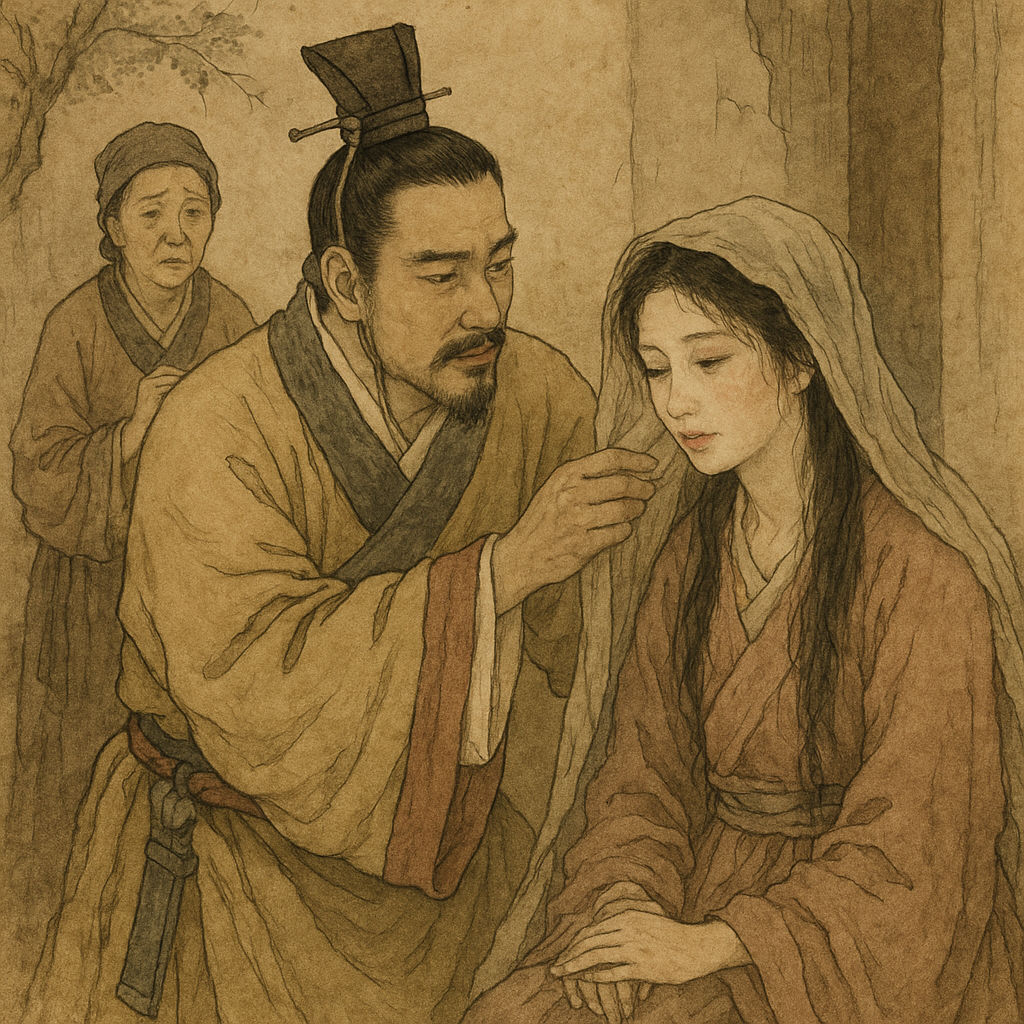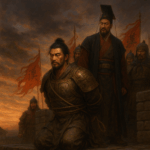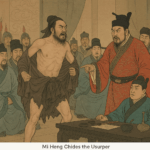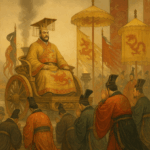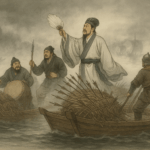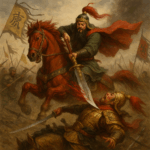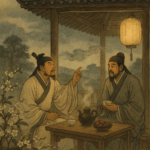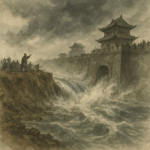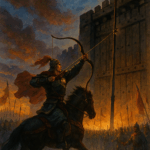When Cao Pi discovered two women crying inside the mansion, he drew his sword to slay them—but suddenly a crimson glow filled his eyes, and he halted. “Who are you?” he demanded. One sobbed, “I am Lady Liu, the wife of General Yuan.” Pi asked of the other, “And who is this lady?” Lady Liu replied, “This is Lady Zhen, the wife of Yuan Xi. Since Xi was dispatched to Youzhou, she refused to follow him and stayed behind.” Pi ordered her brought forward. Her hair was undone and her face smudged with dust. Gently wiping away the grime with his sleeve, he beheld her flawless, jade-like skin and flawless beauty—truly a woman to rival any in the land. He turned to Lady Liu: “I am the son of Chancellor Cao. I will keep your family safe—fear nothing.” He sheathed his sword and took his seat upon the dais.
Meanwhile, Cao Cao marched his generals into Jizhou’s gates. As they approached, Xu You cantered forward, cracked his whip against the gateposts, and taunted, “A-Man (Cao Cao), you cannot enter here without me!” Cao laughed at the jest, though his officers bristled. At the gate of Yuan Shao’s old mansion, he inquired, “Who entered here before me?” The guard replied, “The Young Lord (Cao Pi) is inside.” Cao summoned the young man and rebuked him sharply. Lady Liu then prostrated herself: “Only he could keep me safe. I beg leave to serve Lady Zhen.” Cao commanded that Lady Zhen be presented. Gazing upon her he declared, “Surely she is to be my daughter-in-law!” He then decreed that Pi would not take her as wife.
With Jizhou secured, Cao Cao personally visited Yuan Shao’s tomb to offer sacrifices. Weeping openly, he addressed his ministers: “When Yuan Shao and I first raised our banners, he asked me, ‘If our venture fails, upon what will we depend?’ I asked in turn, ‘What do you propose?’ Shao replied, ‘I will hold the river to the south and bar Yan and Dai to the north, enlisting the desert tribes—so we can contest the realm.’ I responded, ‘With Heaven and men on our side, nothing is impossible.’ Those words echo as if uttered yesterday, yet today he is gone—and how can I not weep?” His generals sighed in sympathy.
Cao awarded Yuan Shao’s widow, Lady Liu, generous gifts of gold, silk, grain, and rice, and proclaimed a full tax exemption for Hebei’s people for that year. He wrote an imperial memorial and took office as Governor of Jizhou himself.
One day, Xu Chu galloped through the East Gate and ran into Xu You. Xu You taunted, “Without me, how could you enter or leave this gate?” Outraged, Xu Chu drew his sword and slew Xu You. He brought the head to Cao Cao, announcing, “Xu You was insolent, so I killed him.” Cao replied, “You and I go back years—we were only joking! Why kill him?” He rebuked Xu Chu severely but honored Xu You with a proper burial.
Cao then searched Jizhou for its finest talents. The people offered up Colonel Cui Suo (courtesy name Jikui), a Qinghe gentleman who once advised Yuan Shao but left in disgust. Cao appointed him Registrar and boasted, “This province holds three hundred thousand souls—a grand commandery indeed!” Cui Suo reproached him: “Chancellor, the realm is sundered, the Yuan brothers tear it apart, and the common folk perish. Should you not first comfort and save them before counting their households?” Cao, moved, apologized and made him an honored guest.
Cao sent envoys after Yuan Tan, who had been pillaging Ganling, Anping, Bohai, and Hejian. Learning that Yuan Shang had fled to Zhongshan, Tan marched to attack him—but Shang—unwilling to fight—fled to Youzhou to join Yuan Xi. Tan absorbed the remnants of Shang’s forces and vowed to retake Jizhou. Summons to court went unanswered, angering Cao, who revoked Tan’s marriage alliance and led his army against Pingyuan.
At Pingyuan, Tan sought aid from Liu Biao, who conferred with Liu Bei. Liu Bei warned that the Yuan cause was lost and rescue was futile; better to send a letter of peace. Biao agreed and dispatched two letters, to Tan and Shang, urging them first to defeat Cao and then to reconcile—words which, upon reading, persuaded Yuan Tan to abandon his plans and flee to Nampi.
Cao pursued swiftly to Nampi. Bitter cold froze the river, trapping his supply boats; he ordered villagers to break the ice but they fled. Furious, he threatened them, but they surrendered en masse. Cao spared them, telling them to hide in the hills.
Yuan Tan sallied out at dawn with Khly civilians in front, his army behind. They burst into Cao’s camp, and for hours the battle raged with no clear victor. Cao dismounted, beat his war drum himself, and rallied his men to victory. Panicked civilians and soldiers alike were slaughtered in the rout. Xu Huang cut down Pang An in single combat, and Tan’s forces collapsed. Cao Hong then slew Yuan Tan himself. Guo Tu fled to the city but was shot down by Yue Jin. Cao pacified the survivors.
Soon, generals from Yuan Xi’s command—Jiao Chu and Zhang Nan, bearing ten thousand men—rode in to surrender, as did the bandit Zhang Yan with his host. Cao made each a marquis and appointed Zhang Yan General Who Pacifies the North.
Yuan Tan’s severed head was displayed at the North Gate with a warning that anyone who mourned would be executed. Prefect Wang Xiu of Qingzhou, clad in mourning robes, wept before the head and told Cao he would gladly die to honor his lord. Impressed, Cao buried Wang’s body with honors and appointed him Gold Purveyor.
Cao asked Wang how best to employ Yuan Shang, who had fled to Yuan Xi. Wang fell silent; Cao praised him for loyalty. He then consulted Guo Jia, who recommended using Jiao Chu and Zhang Nan against Yuan Shang. Cao dispatched three columns—Jiao Chu, Zhang Nan, Lü Kuang, Lü Xiang, Ma Yan, and Zhang Yi—to Youzhou, while Li Dian and Yue Jin joined Zhang Yan to strike Bingzhou and besiege Gao Gan.
Yuan Shang and Yuan Xi, seeing Cao’s columns approach, abandoned Youzhou and fled to join the Wuhuan. Wuhuan Prefect Hu Chuo convened an alliance, swearing blood oaths to side with Cao. Registrar Han Heng objected, refusing to betray Yuan Shao’s memory and left the city. Hu Chuo then welcomed Cao’s armies and was made General Who Guards the North.
A scout reported Yue Jin, Li Dian, and Zhang Yan besieging Bingzhou but unable to seize Huguan Pass, held by Gao Gan. Cao moved there in person. Xun You advised a ruse of feigned defection; Cao agreed. He had Lü Kuang and Lü Xiang lead a small force to request entry, only to open the gates for Cao’s hidden host that night. Gao Gan fled to the Xianbei and then to Liu Biao but was slain en route. Wang Yan delivered his head to Cao, who made Yan a marquis.
With the north pacified, Cao debated a campaign against the remote Wuhuan. His generals demurred, but Guo Jia urged swift surprise. Cao agreed, raised a great host and wagons, and plunged into the frozen wastes. Seeing the hardship, he considered retreat; Guo Jia advised light cavalry and a local guide. They left Guo Jia ill in Yizhou, recruited the veteran Tian Chou as guide, with Zhang Liao as vanguard, Cao himself bringing up the rear.
At White Wolf Mountain, they found Tadu Dun’s scattered forces and struck swiftly. Zhang Liao led a four-pronged assault, routing them and slaying Tadu Dun. Yuan Xi and Yuan Shang fled east to Liaodong. Cao enfeoffed Tian Chou as Marquis of Liuting; Chou humbly refused and was made Gentleman-Attendant. Cao collected tens of thousands of fine horses, endured bitter drought and cold, and returned to Yizhou, rewarding advisors and reminding all that victory was Heaven’s grace and that honest counsel should always be encouraged.
Back in Yizhou, Cao learned that Guo Jia had died. He mourned publicly and lamented the loss of his most trusted strategist, calling upon his provisions to remember his final advice. Xiahou Dun and Zhang Liao urged Cao to seize Liaodong before Gongsun Kang could act. Cao predicted that Kang would deliver the Yuan heads himself—and so it came to pass.
When Yuan Xi and Yuan Shang came to Kang, he feigned hospitality, then executed them both, sending their heads to Cao. Cao, delighted, bestowed high rank on Kang. He revealed Guo Jia’s posthumous letter foreseeing this outcome, and eulogized Jia once more.
At last, Cao camped in the East Watchtower of Jizhou and gazed southward, observing a golden beam of light shooting from earth to sky. Xun You urged a search; Cao ordered digging at the spot, chanting:
“The southern stars shine clear in the sky,
From northern earth a golden treasure rises high.”
What they uncovered will be told in the next chapter.
